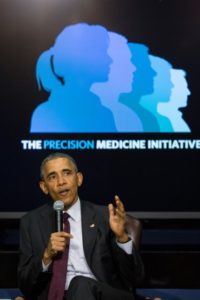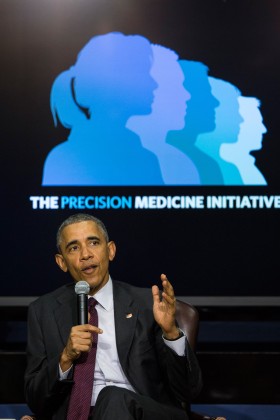
A Shot in the Arm for Obama’s Precision Medicine Initiative
A Shot in the Arm for Obama’s Precision Medicine Initiative
The White House says a huge new database and better genetic testing will help realize the enormous promise of personalized medicine.
Precision medicine is a big idea. Tailoring drugs and therapies to a patient’s individual disease, lifestyle, environment, and genes could touch off healthcare revolution, or so the thinking goes. But first there is much we need to learn about what that all means to a person’s health. That’s why the Obama Administration announced Wednesday evening that it is devoting $55 million this year to the creation of a public database containing detailed health information about a million or more volunteers. It’s also why it’s trying to figure out how to better regulate the fast-growing genetic testing market.
Called the Precision Medicine Cohort, the database will be the “largest, most ambitious research project of this sort ever undertaken,” said Francis Collins, director of the National Institutes of Health, during a call with reporters. It will contain medical records, sequenced genomes, blood and urine tests, and even data from mobile health tracking devices and applications. Collins stressed that the database will represent people from all races, ethnicities, and socioeconomic classes, and said it will track participants over many years.
In a separate but related project, also announced Wednesday, the FDA published draft guidance documents on how it might police the exploding field of genetic testing. The agency is concerned that a new generation of genetic tests could risk patient safety. The technology underlying these tests can quickly and inexpensively sequence an entire genome and identify millions of genetic abnormalities at a time. But interpreting the results is still a work in progress.
 President Obama, discussing precision medicine at an event in February.
President Obama, discussing precision medicine at an event in February.
Many of the tests purport to tell patients whether they have or are at risk for certain diseases and even direct them toward targeted therapies. The whole area has been largely unregulated, but the FDA aims to use its regulatory power to assess how accurate and clinically useful the tests really are.
Advanced tests like these are “pivotal to the future promise of the Precision Medicine Initiative,” said Robert Califf, the FDA’s commissioner, but that promise is only “as good as the tests that guide diagnosis and treatment.” Califf wouldn’t say when the new regulations would be finalized, but the new information should clarify some of the regulatory uncertainty facing companies that develop such tests.

Leave a Reply